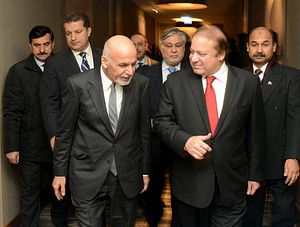Chinese Foreign Minister Wang Yi is expected to make a visit to Kabul soon, according to Afghan President Ashraf Ghani, and possibly step into the role of mediator between Afghanistan and Pakistan. China, a long-time ally of Pakistan, has increasing interest in seeing relations between Kabul and Islamabad calmed.
TOLOnews reported that late Monday, in a meeting with women’s rights activists, Ghani said, “It is the first time that China wants to be a mediator in Afghanistan’s peace process and soon the Chinese foreign minister will visit Kabul. Peace with Pakistan was our demand and this must be solved between government and government.”
It would not be the first time China participated in a peace effort in Afghanistan. The Quadrilateral Cooperation Group (QCG) — Afghanistan, Pakistan, the United States, and China — met for the first time in January 2016 and the fifth in May 2016. The process was plagued by problems; not only were the Taliban reluctant to come to the table but acrimony in the Kabul-Islamabad relationship made such meetings exceptionally frustrating. China’s participation, as Shannon Tiezzi wrote after the first QCG meeting, “signal[ed] its growing involvement in the Afghan peace process.” The four countries were “seen as crucial to ensuring the success of any negotiations with the Taliban, in part because of China’s clout with its ‘iron brother,’ Pakistan,” she said.
Indeed, China’s role in Afghanistan has evolved considerably over the course of the past 16 years. At the same time its relationship with Pakistan has expanded.
China’s increasing regional involvement reflects the growth of Beijing’s economic and strategic interests, part and parcel of its rise to superpower status. The China of 2001 is economic lightyears away from the China of 2017. In 2001, when the U.S. war against the Taliban began, China’s GDP had grown to $1.3 trillion — in 2015, China’s GDP was estimated to be $10.87 trillion.
China’s current economic strategy is bound up with the Belt and Road Initiative. The development of the China-Pakistan Economic Corridor (CPEC) has been positioned as a link between the overland and maritime parts of the Belt and Road. As Chinese construction firms spread across Pakistan, building roadways and railways, Beijing’s regional security interests rose in tandem with its economic interests.
In 2011, Pakistan’s then-ambassador to China, Masood Khan (who was, incidentally, elected president of Azad Jammu and Kashmir in 2016), was effusive in his praise for the China-Pakistan relationship: “We say it is higher than the mountains, deeper than the oceans, stronger than steel, dearer than eyesight, sweeter than honey, and so on.”
But as China’s investments and interests in Pakistan have grown, so too have the risks. Illustrative of this dynamic is the recent news that the two Chinese language teachers kidnapped in May from Quetta, reportedly by Islamic State militants, were killed. Last week, as the news broke, Chinese Foreign Ministry Spokesperson Hua Chunying said Beijing had “stayed in close communication and coordination with Pakistan and spared no effort to rescue [the teachers].”
The alarming reminder of security concerns in the region is perhaps why Kabul is doubling down on nudging China to help clear a workable path to peace.
A deputy spokesman for Ghani, according to TOLOnews, said, “this time the quadrilateral meeting which will be held between Afghanistan, Pakistan, [the] U.S., and China would be different compared to past meetings. At this meeting, Pakistan must support Afghanistan’s policy over fighting insurgency.”
The peace process in Afghanistan is multidimensional but one thing is clear: it must be walked with Pakistan. And Kabul hopes Beijing can bring Islamabad fully to the table.

































